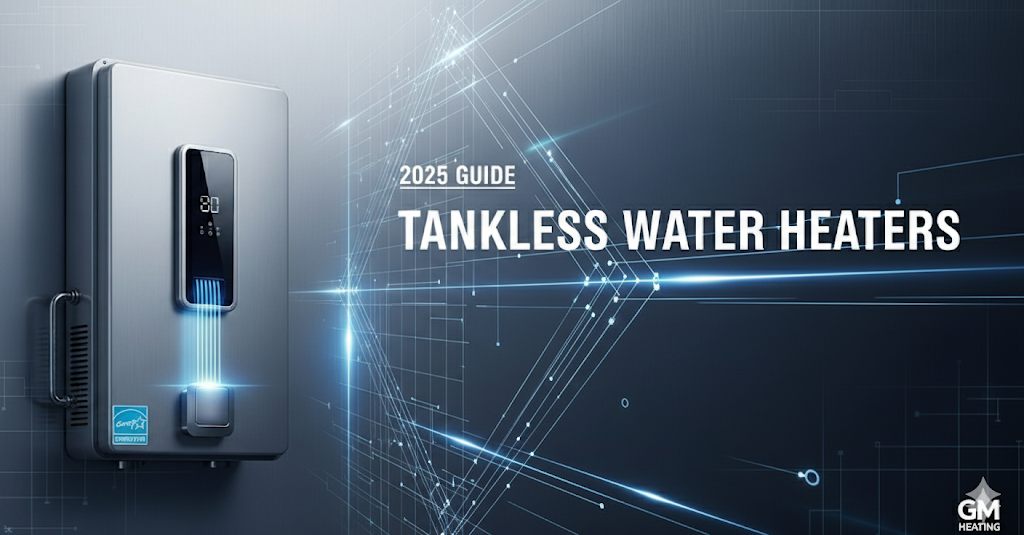Tankless water heaters are becoming the go-to choice for Canadian homeowners in 2025. This detailed guide on tankless water heaters covers their benefits, costs, installation tips, and why they might be the best upgrade for your home.
When it comes to choosing the right water heating solution for your Canadian home or business, many property owners are turning toward modern, energy-efficient options. The 2025 Details Guide: Tankless or Demand-Type Water Heaters provides a comprehensive look at why these systems are quickly becoming the standard across Canada.
Unlike bulky storage tank systems, these advanced units provide hot water only when you need it. With energy prices climbing, sustainability gaining momentum, and new rebates available nationwide, there has never been a better time to evaluate whether a tankless or demand-type system is right for your household.
At GM HEATING AND COOLING INC, we specialize in helping homeowners and businesses make informed decisions about their heating and cooling systems. This detailed guide will walk you through everything you need to know about tankless or demand-type water heaters in 2025.
What Is a Tankless or Demand-Type Water Heater?
The 2025 Details Guide: Tankless or Demand-Type Water Heaters begins with a clear definition. Unlike traditional water heaters that store 40–60 gallons of hot water in a tank, a demand-type water heater heats water instantly as it flows through the system.
Here’s how it works:
- Cold water enters the unit when a hot water tap is opened.
- A gas burner or electric heating element rapidly heats the water.
- The heated water flows directly to your faucet or shower, providing a continuous supply of hot water.
This “on-demand” functionality is why they are often called tankless water heaters.
Supporting keywords in action: This type of energy-efficient water heating system is gaining traction across Canada because it eliminates standby heat loss, lowers energy consumption, and maximizes comfort.
Benefits of Tankless or Demand-Type Water Heaters
The 2025 Details Guide: Tankless or Demand-Type Water Heaters would not be complete without a breakdown of the major benefits Canadian homeowners can expect:
1. Energy Efficiency and Cost Savings
Traditional tank systems must constantly reheat stored water. In contrast, tankless water heater Canada models only operate when hot water is needed. According to Natural Resources Canada, households can save up to 30% on water heating costs annually.
2. Endless Hot Water Supply
Whether it’s multiple showers in the morning or back-to-back laundry cycles, you’ll never run out of hot water. Large families especially appreciate this benefit.
3. Compact and Space-Saving Design
No more bulky water tanks taking up space in your basement or utility room. A demand water heater installation can be wall-mounted, freeing valuable square footage.
4. Long Lifespan and Lower Maintenance
With proper servicing, tankless models often last 20 years or more, compared to 10–12 years for storage tanks.
5. Eco-Friendly Operation
Reducing wasted energy means lowering greenhouse gas emissions. A tankless or demand-type water heater directly supports Canada’s sustainability goals.
What to Consider Before Choosing a Tankless or Demand-Type Water Heater
While the 2025 Details Guide: Tankless or Demand-Type Water Heaters highlights impressive advantages, it’s important to consider potential challenges:
- Higher Initial Cost – The upfront purchase and installation can be more expensive than tank systems.
- Installation Requirements – Homes may need electrical upgrades or gas line adjustments.
- Flow Rate Limitations – For large households, multiple units may be required to meet simultaneous demand.
- Maintenance – Annual descaling is recommended, especially in regions with hard water.
At GM HEATING AND COOLING INC, our certified technicians evaluate your home’s infrastructure to ensure your investment delivers maximum comfort and efficiency.
2025 Details Guide: Tankless or Demand-Type Water Heaters – Why 2025 Is the Year to Upgrade
So why does the 2025 Details Guide: Tankless or Demand-Type Water Heaters emphasize upgrading now? Several key reasons make this year ideal:
- Rebates & Incentives – Many Canadian provinces offer rebates for installing energy-efficient water heaters. These programs can offset upfront costs significantly.
- Rising Energy Costs – With natural gas and electricity prices climbing, the savings from a tankless system are even more valuable.
- Smart Technology – Today’s tankless units include Wi-Fi connectivity and remote monitoring for greater convenience.
- Government Focus on Sustainability – Choosing a demand-type system aligns with federal and provincial climate action goals.
Finding the Right Tankless or Demand-Type Water Heater for Your Home
Every Canadian household is unique. The 2025 Details Guide: Tankless or Demand-Type Water Heaters stresses the importance of professional guidance when choosing the right system. Key factors include:
- Fuel Type – Gas models generally offer higher flow rates, while electric units are easier to install.
- Sizing – The correct size depends on the number of fixtures and household demand. Undersizing can lead to inconsistent performance.
- Installation Location – Tankless units can be wall-mounted indoors or outdoors, depending on the model.
- Professional Installation – Improper installation is the leading cause of performance issues. Trust experts like GM HEATING AND COOLING INC to handle your installation properly.
Canadian Success Stories with Tankless or Demand-Type Water Heaters
To illustrate, the 2025 Details Guide: Tankless or Demand-Type Water Heaters includes real-life examples:
- Toronto Family of Five – Constantly ran out of hot water with their old tank system. After installing a tankless system, they now enjoy unlimited showers and reduced bills.
- Edmonton Couple – Wanted to maximize space in their small home. By switching to a demand-type water heater, they freed up a full closet and cut energy use.
- Vancouver Business Owner – Needed reliable hot water for a café. A commercial tankless system ensures customers and staff always have access to hot water without high utility costs.
Maintenance Tips for Tankless or Demand-Type Water Heaters
The 2025 Details Guide: Tankless or Demand-Type Water Heaters also includes essential care tips:
- Annual Professional Inspection – Ensures gas or electric components are functioning correctly.
- Descaling – Especially important in hard water regions; prevents mineral buildup.
- Filter Cleaning – Keeps water flow steady and efficient.
- System Flush – Performed periodically to extend system life.
Pros and Cons of Tankless or Demand-Type Water Heaters
Pros:
- Energy-efficient and cost-saving
- Endless hot water supply
- Long lifespan (up to 20+ years)
- Compact design saves space
- Lower carbon footprint
Cons:
- Higher initial investment
- Complex installation requirements
- May require multiple units in large homes
- Regular maintenance needed
Conclusion:
Is a Tankless or Demand-Type Water Heater Right for You?
The 2025 Details Guide: Tankless or Demand-Type Water Heaters makes one thing clear: these systems represent the future of home comfort in Canada. With rising energy prices, government incentives, and advanced technology, tankless water heaters are a smart investment.
Whether you’re a homeowner tired of running out of hot water or a business owner looking to reduce operating costs, upgrading to a demand-type system offers long-term rewards.
At GM HEATING AND COOLING INC, we provide expert guidance, installation, and maintenance to ensure your water heating system meets your household needs for decades to come.
FAQ:
Q: Do tankless water heaters work well in Canadian winters?
Yes. High-quality gas-powered units are designed to perform reliably even in cold climates.
Q: Can a tankless water heater replace any existing system?
In most cases, yes, but some homes may require electrical or gas upgrades.
Q: How long does installation take?
A professional installation from GM HEATING AND COOLING INC typically takes one day.
Q: Are rebates available in 2025?
Yes, various provinces in Canada offer rebates for upgrading to energy-efficient systems.


